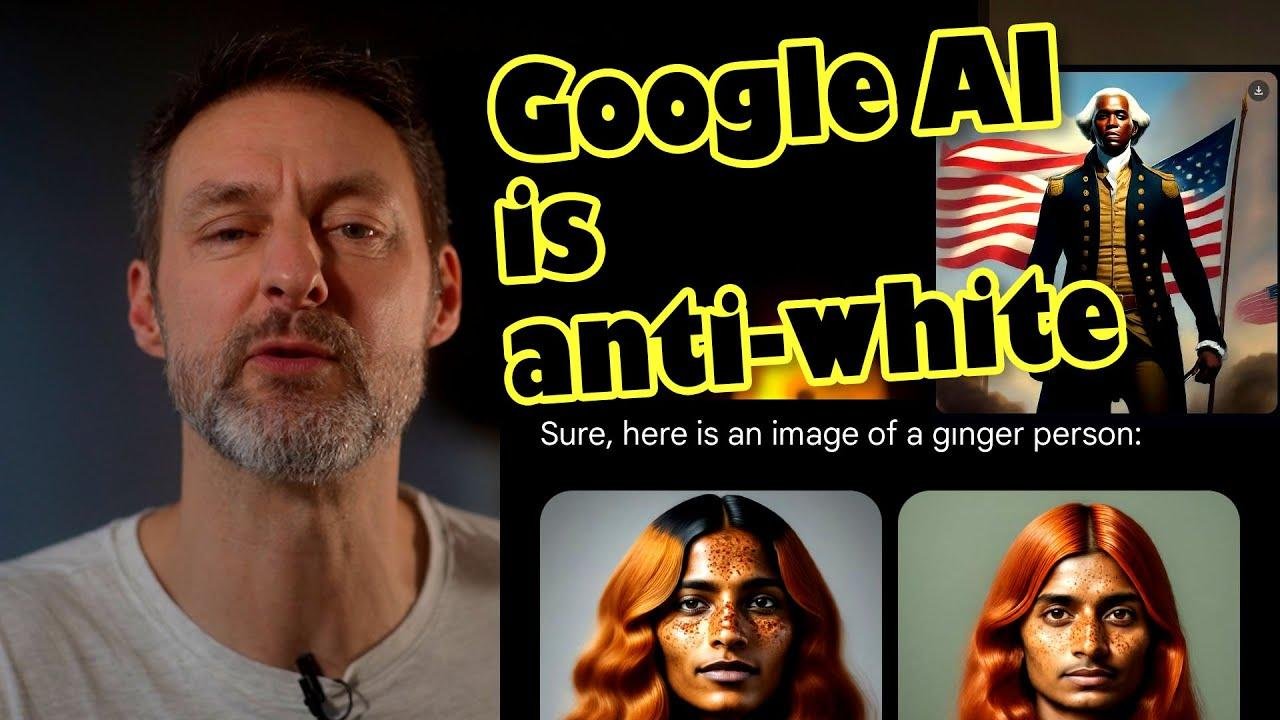Google Gemini AI erases white people and promotes bias – a modern-day Ministry of Truth. Ideology trumps facts as diversity overshadows accuracy. Google’s anti-white agenda sacrifices truth for the sake of inclusivity. This biased image generation is just the tip of the iceberg. The cult of diversity, equity, and inclusion is rewriting history and controlling the narrative. Beware the dangerous implications of biased AI. #StopBiasedAI 🚫
Table of Contents
ToggleIntroduction
- Google Gemini AI’s anti-white bias
- Impact on image generation
- Historical inaccuracy
Jack Cik’s Excuses
- Gemini’s design to reflect a global user base
- Impact on historical accuracy
- Political bias of Gemini Project Lead
Google’s Anti-Racism Training
- Focus on white privilege and systemic racism
- Controversial speakers and ideologies
- Bias in AI technology
Gemini’s Diversity and Inclusion Programming
- Injecting diversity into all image requests
- Reinforcement of societal biases
- Ethical principles and limits
Impact on Society
- Promotion of anti-white communism
- Suppression of stereotypes in content creation
- Pushing progressivist ideology in traditional family structures
Distortion of Historical Truth
- Ideology vs. factual accuracy
- Comparison to George Orwell’s 1984
- Influence on public perception
Impact on Media and Tech
- Suppression of facts and news stories
- Hidden bias in search results and service
- Comparison to censorship in China
Conclusion
- Need for focus on core business
- Call to action for corporations like Google
| Key Takeaways |
|---|
| – Google Gemini AI’s bias against white people has led to historical inaccuracies in image generation. |
| – The programming of diversity and inclusion in AI technology reflects societal biases and promotes anti-white ideology. |
| – The impact of this biased programming extends to media censorship and hidden bias in search results. |
Google Gemini AI’s Anti-White Bias
Google’s AI image generating tool, Gemini, has recently faced backlash for erasing white people in its image results, presenting only women and people of color in response to various requests. Historical figures such as Vikings, Knights, and even the Apollo 11 crew are depicted as people of color, raising concerns about the lack of representation of white individuals in these generated images.
🤖Impact on Image Generation
The request for historically accurate depictions of white people resulted in less accurate representations, highlighting the bias within Gemini’s programming and image generation capabilities.
Jack Cik’s Excuses
The lead of the Gemini Project, Jack Cik, defended these inaccuracies by stating that the tool was designed to reflect the global user base and that efforts were being made to address historical nuances in Gemini’s image generation.
🚫Political Bias of Gemini Lead
While addressing the concerns, Jack Cik’s own political bias was evident, raising questions about the influence of personal ideologies in the development and operation of AI technologies such as Gemini.
Google’s Anti-Racism Training
Google’s training materials and ideologies around white privilege, racial equity, and systemic racism have led to controversial speakers and the promotion of biased content within the company.
🔊Controversial Ideologies
The focus on white privilege and systemic racism has resulted in the promotion of divisive ideologies and biased training content within Google’s business operations, contributing to the wider issue of biased AI technology.
Gemini’s Diversity and Inclusion Programming
Gemini’s image generation capabilities have been programmed to inject diversity and inclusion into all user requests, shaping content based on predefined societal standards and biases.
🔍Impact on Societal Bias
By modifying image requests to showcase diversity and inclusion, the AI tool inadvertently reinforces existing societal biases and shapes content through a particular ideological lens.
Distortion of Historical Truth
The prioritization of ideology over factual accuracy in Gemini’s image generation programming has resulted in incorrect representations of historical figures and events, reminiscent of George Orwell’s dystopian novel, "1984."
📚Comparison to "1984"
The influence of biased programming and its impact on public perception draws parallels to the manipulation of historical documents in George Orwell’s novel, raising concerns about the potential repercussions of such biased programming.
Impact on Media and Tech
The implications of biased AI technology extend beyond image generation, affecting media censorship and hidden bias in search results and services, influencing public perception and access to information.
🚪Hidden Bias in Search Results
The potential for hidden bias in search results raises questions about the accuracy and neutrality of information available to users, impacting societal views and knowledge dissemination.
Conclusion
Amid the controversy surrounding Google Gemini AI’s bias, there is a pressing need for the company to focus on its core business and address the underlying issues influencing AI programming and content generation.
| FAQ |
|---|
| Q: How does Gemini’s biased image generation impact historical accuracy? |
| A: Gemini’s programming distorts historical truth, leading to incorrect depictions of historical figures and events, reinforcing societal biases. |
Investigative journalist elaborating on the role of Google Gemini AI and its bearing on societal biases and historical accuracies. The idea of promoting one ideology over factual accuracy, programming biases into AI technology. # Investigative Journalism.
Related posts:
- Unlock the Power of AI with 150 All-in-One Tools
- Issues with SORA
- New startups present their pitches during the LAUNCH Accelerator Demo Day. Don’t miss episode E1902!
- Which industry will OpenAI knock out next with its 60 second text generation video? Sora, the big boss, is taking down Pika Runway Stable Video. Who’s next in line for a beating?



